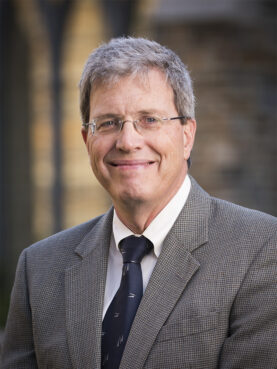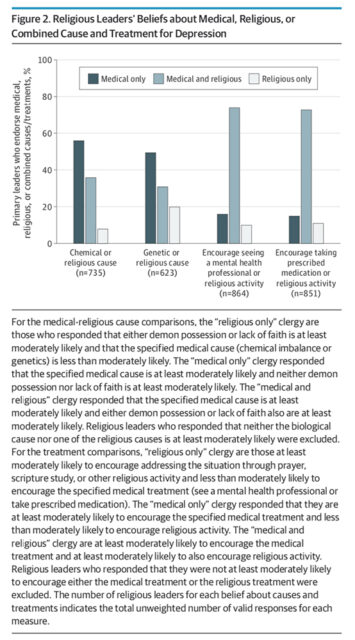US clergy favor medical remedy for despair

(RNS) — About 21 million adults within the U.S. have had not less than one main depressive episode, the Nationwide Institute of Psychological Well being studies.
A brand new examine now finds that those that have gone to a priest or pastor for recommendation will most certainly have been inspired to hunt out psychological well being professionals and take medication to deal with it.
That’s the conclusion of a nationally consultant survey of clergy serving U.S. congregations from throughout the non secular spectrum. The Nationwide Survey of Non secular Leaders requested 890 folks whose main job is as a clergy chief about causes of despair and applicable therapies for it.
Printed this week in JAMA Psychiatry, the examine studies that 90% of clergy respondents stated they’d encourage somebody with depressive signs to see a psychological well being skilled and 87% would encourage folks to take prescribed drugs for it.

Mark Chaves. Picture © Duke College
“There are some clergy on the market that discourage medical care,” stated Duke College sociologist Mark Chaves, who co-authored with the examine with Duke sociologist Anna Holleman. “However it seems, it’s a small minority, even amongst conservative non secular teams.”
The examine, funded by the Templeton Basis and fielded from February 2019 to June 2020, is considered the primary nationally consultant survey of clergy beliefs on despair, Chaves stated. The bigger examine included 1,600 congregational leaders from which 890 main clergy had been polled for the despair examine.
Whereas many clergy additionally inspired non secular remedy for despair, similar to prayer or Scripture examine, these non secular cures had been supplementary. They didn’t change medical remedy.
The examine additionally requested clergy what they thought had been the explanations folks skilled despair. The overwhelming majority attributed it to “hectic circumstances,” “traumatic experiences,” “chemical imbalance,” “lack of social help” or a “genetic downside.”
Solely 29% of clergy stated despair was brought on by “lack of religion,” and 16% stated “demon possession.”
Black Protestants and white evangelical Protestants had been extra possible than Catholic monks or white mainline Protestant ministers to encourage non secular remedy of despair, with out a medical element. Even amongst these teams, although, solely a small minority — about 15% — endorsed substituting non secular for medical responses.
Non-Christian clergy comprised 8.5% of these surveyed and included Jewish, Muslim, Hindu and Buddhist leaders. They scored equally to mainline Protestants and Catholics, Chaves stated, with very “pro-medical” views on treating despair.
Most clergy endorsed mixing each medical and non secular approaches to despair.
“These outcomes counsel that medical professionals ought to view the overwhelming majority of spiritual leaders as allies in figuring out and correctly treating despair,” the examine concludes.
RELATED: As despair, nervousness, grief spike throughout pandemic and protest, church buildings provide hope, psychological well being assets

“Non secular Leaders’ Beliefs about Medical, Non secular, or Mixed Trigger and Remedy for Despair” Graphic courtesy of JAMA Psychiatry
Main despair is the commonest psychological dysfunction within the U.S. and is the strongest threat issue for suicide. Research have proven a rise in despair within the U.S. inhabitants from 6.6% in 2005 to as excessive as 9% in 2020, based on a examine revealed final yr by Columbia College Mailman College of Public Well being and Metropolis College of New York.
The Nationwide Survey of Non secular Leaders was carried out on-line, on paper and by cellphone simply because the coronavirus pandemic started. However Chaves stated he didn’t suppose the outcomes would change dramatically if the examine had been fielded immediately.
“I don’t see why the pandemic may change folks’s views of the underlying causes of despair and how one can deal with it,” he stated. Nonetheless, he stated, the examine supplied a baseline that ought to be repeated to evaluate adjustments over time.
Harold G. Koenig, a Duke professor of psychiatry and behavioral sciences who was not linked to the examine, stated its outcomes had been heartening.
“Nearly all of psychological well being professionals aren’t non secular, and that’s an issue as a result of the vast majority of their sufferers are,” Koenig stated. “So it’s encouraging to see the overwhelming majority of clergy see despair as one thing that’s extra more likely to have organic or situational moderately than non secular causes.”
RELATED: Research: Faith and spirituality can help youth psychological well being disaster




